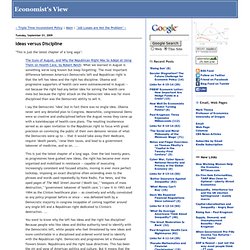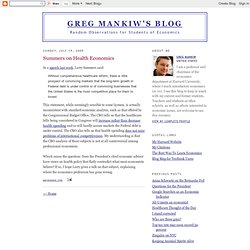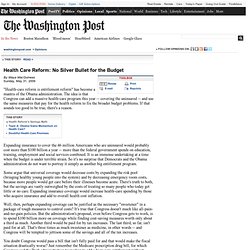

The Gates Notes. Marginal Revolution: Motorcycle helmet externality of the day. John F. Cogan, R. Glenn Hubbard, and Daniel Kessler: Doubling Down on a Flawed Insurance Model. Economic View - Who Will Determine Who Pays for Equality in Health Care? By Andrew Sullivan. Economist's View: Ideas versus Discipline. "This is just the latest chapter of a long saga": The Guns of August, and Why the Republican Right Was So Adept at Using Them on Health Care, by Robert Reich: What we learned in August is something we've long known but keep forgetting: The most important difference between America's Democratic left and Republican right is that the left has ideas and the right has discipline.

Obama and progressive supporters of health care were outmaneuvered in August -- not because the right had any better idea for solving the health care mess but because the rights' attack on the Democrats' idea was far more disciplined than was the Democrats' ability to sell it. I say the Democrats' "idea" but in fact there was no single idea. Obama never sent any detailed plan to Congress. Meanwhile, congressional Dems were so creative and undisciplined before the August recess they came up with a kaleidoscope of health-care plans. This is just the latest chapter of a long saga.
Blog Archive » Taxing the young to pay for the old to dwell in sickness. Lwside1 : Message: The Health Care Math Everyone Avoids. Why We Must Ration Health Care. Summers on Health Economics. In a speech last week, Larry Summers said: Without comprehensive healthcare reform, there is little prospect of convincing markets that the long-term growth in Federal debt is under control or of convincing businesses that the United States is the most competitive place for them to invest.

This statement, while seemingly sensible to some laymen, is actually inconsistent with standard economic analysis, such as that offered by the Congressional Budget Office. The CBO tells us that the healthcare bills being considered in Congress will increase rather than decrease health spending and so will hardly assure markets the Federal debt is under control. The CBO also tells us that health spending does not raise problems of international competitiveness. My understanding is that the CBO analysis of these subjects is not at all controversial among professional economists. - Health Care Reform: No Silver Bullet for the Budget - washingtonpost.com. "Health-care reform is entitlement reform" has become a mantra of the Obama administration.

The idea is that Congress can add a massive health-care program this year -- covering the uninsured -- and use the same measures that pay for the health reform to fix the broader budget problems. If that sounds too good to be true, there's a reason. Expanding insurance to cover the 46 million Americans who are uninsured would probably cost more than $100 billion a year -- more than the federal government spends on education, training, employment and social services combined. It is an immense undertaking at a time when the budget is under terrible strain. So it's no surprise that Democrats and the Obama administration do not want to portray it simply as another big entitlement program. Well, then, perhaps expanding coverage can be justified as the necessary "sweetener" in a package of tough measures to control costs? Two cost-saving measures hold the most promise.